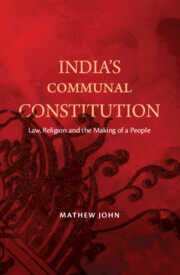3 - A Lurking Majoritarianism
A Communal Account of Minority Rights
Published online by Cambridge University Press: 05 August 2023
Summary
This chapter extends the axiomatically and scripturally organised depiction of the Indian people developed in earlier chapters to the problem of representation and self-government. Doing so, the emphasis of enquiry shifts from religion and religious identity as objects of government to religious identity as it has organised and structured the contours of the Indian state. This shift in emphasis is framed by the third of the three constituent axes that structure this book – namely forms of political representation that originated in colonial India that continue to inflect contemporary constitutional government. Accordingly, this chapter on minority rights and the following chapter on caste identity detail the communal representation of the Indian people across colonial and contemporary constitutional practice.
To ascertain the continuing imprint of a communally imagined people on the organisation of minority rights, this chapter is divided into three sections. First, an outline of minority rights in the colonial state. Second, an examination of the recessed communal form through which minority rights were reworked and inserted into the Constitution of independent India. Third, the continuing imprint of this communal conceptualisation of the Indian people in contemporary constitutional practice.
The Pedagogical Foundations of Indian Constitutionalism
Minority rights were the very ground on which the British colonial state shaped representative politics for India in the late nineteenth and early twentieth centuries. The constitutional contours of minority rights unfolded over this period through a series of constitutional statutes, most notably the Indian Councils Act ,1909, the Government of India Act, 1919, and the Government of India Act, 1935. Each of these statutes drew large numbers of Indians into the British government and also set the path for the subsequent organisation of the Indian government. Further, when the Constitution of independent India was adopted, a significant part of the new institutional arrangement drew on the earlier Government of India Act of 1935. However, continuities in constituent imagination do not just narrate the endurance of institutional frames and practices, but the survival of forms through which a polity carves out and makes salient its people. It is this dimension of minority rights that must now be outlined.
To cut through much historical detail, the colonial template framing a constituent horizon for modern India was first organised as a project of ‘trust’ whose goal was the transfer of power to the Indian people.
- Type
- Chapter
- Information
- India's Communal ConstitutionLaw, Religion, and the Making of a People, pp. 71 - 97Publisher: Cambridge University PressPrint publication year: 2024



